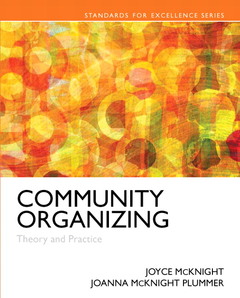Description
Community Organizing
Theory and Practice
Advancing Core Competencies Series
Authors: McKnight Joyce, McKnight Plummer Joanna
Language: English
Subject for Community Organizing:
88.36 €
In Print (Delivery period: 14 days).
Add to cart400 p. · 10x10 cm · Paperback
Description
/li>Contents
/li>Biography
/li>Comment
/li>
Explores how helping professionals effectively work in the community.
Community Organization: Theory and Practice provides readers with the theories, tools and strategies needed to organize effective, participatory change efforts in communities. Readers will learn how these theories inform and can help direct the type of organizing that will work best for a specific community based on its personality, needs, and resources. Community Organization is designed as both a textbook and a reference guide for professionals in the helping field.
Standards for Excellence Series - Designed to help students advance their knowledge, values, and skills, the Standards for Excellence Series assists students in associated CSHSE's National Standards to all levels of human service practice. The Standards for Excellence grid at the start of the book provides a quick view of the CSHSE Standards addressed in each chapter.
Improve mastery and retention with the Enhanced Pearson eText
The Enhanced Pearson eText provides a rich, interactive learning environment designed to improve student mastery of content. The Enhanced Pearson eText is:
- Engaging. The new interactive, multimedia learning features were developed by the authors and other subject-matter experts to deepen and enrich the learning experience.
- Convenient. Enjoy instant online access from your computer or download the Pearson eText App to read on or offline on your iPad® and Android® tablet.*
- Affordable. Experience the advantages of the Enhanced Pearson eText along with all the benefits of print for 40% to 50% less than a print bound book.
*The Pearson eText App is available on Google Play and in the App Store. It requires Android OS 3.1-4, a 7? or 10? tablet, or iPad iOS 5.0 or later.
- Chapter 1. Defining Community
- Chapter 2. Communities as Systems
- Chapter 3. Living and Working in Communities
- Chapter 4. Varieties of Community Organizing
- Chapter 5. The Community Organizing Cycle
- Chapter 6. Building an Effective Leadership Team
- Chapter 7. Participatory Research
- Chapter 8. Planning and Implementation
- Chapter 9. Management and Evaluation
- Chapter 10. Organizational Structure, Budgeting, and Funding
- Chapter 11. Power and Empowerment
- Chapter 12. Navigating the Political Labyrinth
- Chapter 13. Value Systems and Ethics
- Chapter 14. Community Organizing with Web-Based Tools
- Chapter 15. Organizations that Support Community Organizing
Joyce Sheldon McKnight, D.Ed. is Associate Professor of Community and Human Services at the innovative Empire State College of the State University of New York. She has over forty years of direct community organizing experience in urban and rural place-based communities, communities of interest, diasportic communities and online social networks. She has taught community organizing principles and practices to hundreds of adult undergraduate and graduate students from around the world, many of whom have used participatory community organizing to implement exciting community-based projects including projects in Haiti, India, and South Africa. Since 2003, she has had major responsibility for the development and supervision of comprehensive community and human services and public affairs curricula for the burgeoning Center for Distance Learning of SUNY/Empire State College. In 2007 she received the college’s prestigious Altes Award for Community Service and Scholarship and in 2009 received the Phyllis M. Cunningham Award for Social Justice Research from the Adult Education Research Conference. She is a frequent contributor to national and international conferences and has reviewed articles on participatory research and popular education for the Adult Education Quarterly. Her areas of expertise are participatory community organizing, self-directed learning, distance learning, prior learning assessment, open educational resources for developing nations and on-line community building.
Joanna McKnight Plummer is a recent graduate of the State University of New York in community and human services with additional graduate studies in mental health counseling. She brings practical experience in community-based organizing in both city and rural settings as well as the student perspective to the tone, content, and readability of this
- Encourages Critical Thinking - Standards for Excellence critical thinking questions challenges students to think critically about the standards in relation to chapter content. Chapter reviews allow students to connect to scenario-based reviews including short-answer discussion questions. Self-study quizzes found throughout the text, self-study quizzes test student knowledge and comprehension of key chapter topics.
- Engages Students Through Case Studies - Two composite geographic communities based on real organising efforts are used throughout the text to illustrate key ideas, principles, and applications. A process-centered approach enables readers to apply participatory principles to their own organising efforts.
- Incorporates Solid Academic Research - Based on decades of practical experience, this book is backed by solid academic research. Senior author Joyce McKnight is a recognised scholar, teacher and organiser with forty years of experience in participatory research, popular education and social justice.
- Emphasis on Participatory Organising Processes - This title has an emphasis on participatory processes - enabling community members to improve the quality of community life through maximum local participation and minimum outside intervention.
- Simplified System Thinking - Written in a learner-friendly style, this title uses the metaphor of a microscope to help readers grasp the intricacies of system thinking by looking closely at the focal system and expanding outward to understand the intricacies of a community.




